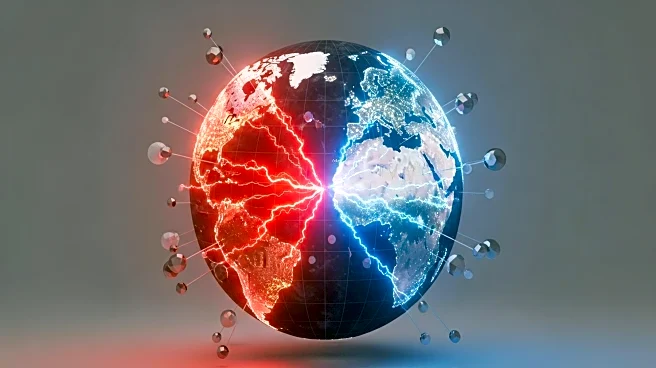What is the story about?
What's Happening?
The trade relationship between the U.S. and China is experiencing heightened tensions following Beijing's announcement of new restrictions on rare earths exports and additional measures against U.S. companies. In response, President Trump has threatened to impose 100% more tariffs on Chinese goods. Analysts suggest that these actions are part of a broader negotiation strategy ahead of a potential meeting between the two countries' leaders. The restrictions could significantly impact U.S. chipmakers, as they may require licenses from China's Commerce Ministry to export products containing Chinese rare earths. The situation has led to stock market volatility, reflecting concerns over the economic implications of the escalating trade conflict.
Why It's Important?
The restrictions on rare earths exports are critical because these materials are essential for manufacturing high-tech products, including semiconductors. The U.S. relies on China for a significant portion of its rare earths supply, and the new measures could disrupt production for major tech companies like Nvidia and Intel. The escalating trade tensions could further strain diplomatic relations and impact global supply chains, potentially leading to increased costs for consumers and businesses. The situation highlights the strategic importance of rare earths in international trade and the potential for economic leverage in geopolitical negotiations.
What's Next?
Both countries are expected to continue negotiations, with potential diplomatic resolutions being explored. President Trump has indicated a willingness to meet with Chinese President Xi Jinping at the upcoming APEC meeting in South Korea. The timeline for implementing tariffs and export restrictions provides a strategic buffer for diplomatic efforts. However, the lack of mutual trust remains a significant barrier to achieving a lasting solution. Analysts will be watching for any signs of compromise or further escalation in the coming weeks.
Beyond the Headlines
The trade tensions underscore the broader geopolitical rivalry between the U.S. and China, with both nations seeking to assert their influence in global markets. The situation raises ethical questions about the use of economic measures as tools of foreign policy and the potential consequences for international cooperation. Long-term shifts in trade policies could lead to a reconfiguration of global supply chains, with countries seeking to reduce dependence on Chinese rare earths.















